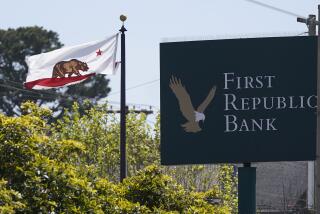Investor Got a Bargain in Buying Failed S&L; : Finance: Revlon Chairman Ronald O. Perelman stands to gain millions after agreeing to take over First Gibraltar Bank of Houston.
- Share via
NEW YORK — When government officials sold dozens of failed savings and loans in the waning days of 1988, some thrift experts criticized the deals as too generous for the buyers and too rough on taxpayers.
Now the numbers on one of the largest deals are in, and the critics are saying they were right.
Ronald O. Perelman, chairman of New York-based Revlon Inc. and the country’s fifth-richest person according to Forbes magazine, will recover $1.70 this year for every $1 he invested last year in First Gibraltar Bank, a Houston savings and loan, according to a confidential financial document obtained by Newsday.
First Gibraltar will provide Perelman with a $104-million profit for 1989, according to figures derived from the document. In addition, tax breaks from owning the S&L; will save Perelman $170 million in federal income taxes. The profits and the tax savings combine to give Perelman about a 170% return on his $160-million investment.
Making money isn’t new for Perelman, who has built an estimated $2.75-billion fortune from buying and selling companies. Perelman, 46, is regarded as one of the nation’s shrewdest investors.
Nevertheless, S&L; analysts were surprised when told of Perelman’s return on the purchase of First Gibraltar. “What this means is Perelman has gotten all his money back,” said Bert Ely, an Alexandria, Va., savings and loan expert who criticized the First Gibraltar deal last year. “Everything from now on is pure gravy. They could take that thing away from him tomorrow and he’s already had a hell of a good deal.”
The purchase agreement calls for Perelman to get government assistance and tax breaks for another nine years.
“It’s a fantastic return,” said Robert Litan, a senior fellow at the Brookings Institution in Washington after studying the nation’s S&L; crisis. “If these numbers are right, it’s out of all proportion to the risks.” He said risky deals that turn out well usually have a return of about 30% a year.
Howard Gittis, a senior aide to Perelman, declined to comment. He said he couldn’t discuss First Gibraltar’s financial performance because the institution is in the process of selling some bonds.
The disclosure comes at a time of increasing concern on Capitol Hill about the deals that savings-and-loan regulators arranged during the waning moments of 1988. Eager to unload money-losing S&Ls;, the Federal Home Loan Bank Board, led by M. Danny Wall, sold 68 failed institutions last December before the tax breaks expired at year’s end. The breaks allowed investors to deduct from their other income whatever the S&L; would have lost if it hadn’t been bailed out.
The cost of bailing out the savings and loans of the so-called “December deals” and the nation’s other sick S&Ls; is estimated at $160 billion.
House Banking Committee Chairman Henry B. Gonzalez (D-Tex.) has said his committee will investigate each of the December deals. The Perelman transaction is the largest.
“Our chairman feels they’re not cost-effective,” said Julie Black, a spokeswoman for the committee. “Gonzalez is really concerned that the government did not get the best deals on these last-minute transactions.” She said First Gibraltar is likely to come up in hearings that are to begin Jan. 22.
Former Bank Board member Lawrence White defended the Perelman deal as the best the government could arrange at the time. “I’m still convinced it’s the best deal we could get for taxpayers,” said White, now a New York University professor. He said it would have cost taxpayers more to liquidate the institution.
White added that Perelman deserves to be compensated for the tremendous risks he took in buying First Gibraltar. White said that no one knew for sure last December whether the government would make good on the Bank Board promises to S&L; investors.
Litan, however, said Perelman took little risk because the chances of the government reneging were remote. He believes Perelman got such good terms because he was one of the few people willing to take on a sick Texas S&L.;
First Gibraltar has about $9 billion in loans and other assets. About $4 billion worth are in default and losing money. Under the terms of Perelman’s takeover agreement, the government makes up the losses and guarantees a profit. According to the financial document--a confidential-offering circular used to refinance First Gibraltar’s debt--the government will contribute about $700 million to the thrift this year.
With the government assistance, First Gibraltar will make about $130 million, making it one of the most profitable S&Ls; in the country. Under the terms of Perelman’s takeover, he gets to keep 80% of the profits, or $104 million.
That’s only part of Perelman’s return. The rest comes in the form of a tax break for MacAndrews & Forbes, the company that owns First Gibraltar. MacAndrews & Forbes, 100% owned by Perelman, also owns cosmetics giant Revlon.
MacAndrews & Forbes can shield about $510 million in income in 1989, the document said. At a 34% tax rate, that saves Perelman about $170 million in taxes.
More to Read
Inside the business of entertainment
The Wide Shot brings you news, analysis and insights on everything from streaming wars to production — and what it all means for the future.
You may occasionally receive promotional content from the Los Angeles Times.









